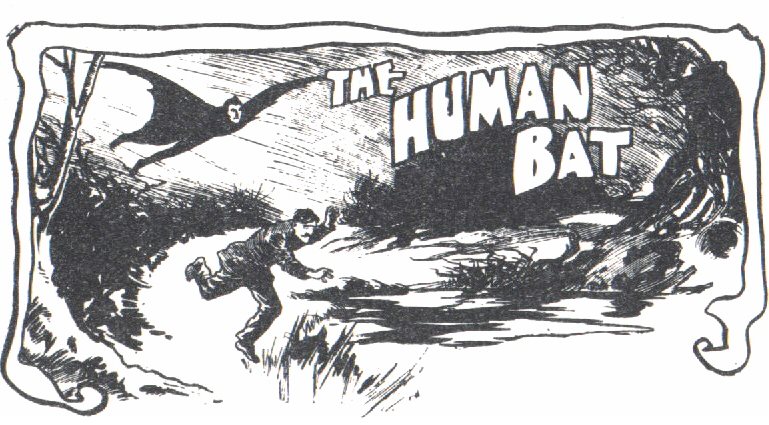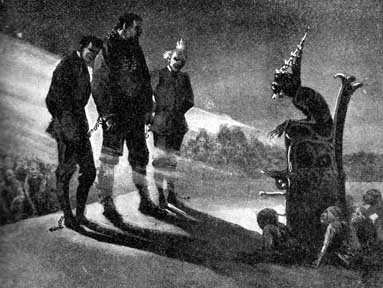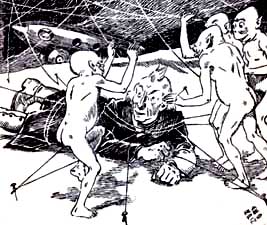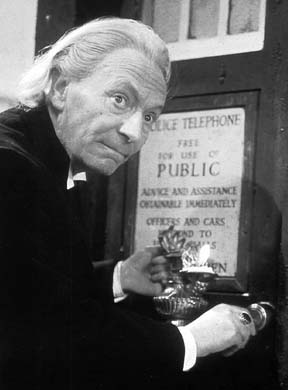- Loki
- Moderator
 Offline
Offline - Registered: 1/03/2020
- Posts: 11,705
Haven't I seen you somewhere before?
or "There is no such thing as an original idea."
Sometimes you come across a character or concept in a fictional tale that seems eerily similar to a much better known character/concept, so much so that you'd be tempted to think that the lesser known version is plagiarising the better known one...except that it came first. And it's too obscure for there to be any likelihood that it inspired the better known version either. I'm not sure there's enough of these to sustain a thread, but if anyone else has more examples than the ones below, feel free to add them.
First up we have an advert I came across in an old British story paper (like comics, except that the tales are mostly prose with a few illustrations). 
Anyone else think the viking on the left looks familiar? And he's looking for the hammer of Thor! Clearly someone ripped off Kirby and Lee...if not for the fact that this was published in 1947.
Meanwhile the night is haunted by a caped, batlike figure who fights crime, lives the life of a wealthy playboy in a mansion but also resides in a cave, and has a trusted manservant. He chose his costume identity to become a terror to criminals, and at the moment he was trying to pick said motif was inspired by an unexpected encounter with a bat. No, not that Johnny-come-lately Batman! I mean 1899's Human Bat!
- Andy E. Nystrom
- One Above All (Adminstrator)
 Offline
Offline 
- From: Victoria, BC
- Registered: 1/03/2020
- Posts: 6,947
Re: Haven't I seen you somewhere before?
There's Nothing Out There might appear at first glance to be a low budget rip-off of Scream (characters realizing there in a horror movie scenario), only Scream came out in 1996 and There's Nothing Out There in 1991.
But if you want to go beyond concept to actual execution, Troma's War opens with characters wandering around dazed after their plane crashed on an island. Wreckage all around. They look lost, even. But while the first episode of Lost, with a very similar opening scene aired in 2004, Troma's War was released in 1988.
Here's the scene from Lost:
Troma has the entire Troma's War for free on their YouTube channel, so might as well post to that. Since the comparison is between opening scenes, the scene in question isn't hard to find.
- Loki
- Moderator
 Offline
Offline - Registered: 1/03/2020
- Posts: 11,705
Re: Haven't I seen you somewhere before?
Another one, which is likely already known to some here. In 1906 a French novel introduced the world to Doctor Omega, a scientist with a craft capable of traversing time and space. The novel was illustrated, and so you can see the title character in the middle of this picture:
It was re-released in 1949 with new illustrations, such as this one:
In 1963, the BBC launched Doctor Who, then starring William Hartnell.
Noting this similarity, and that WHO inverted is OHM, a unit of electrical resistance whose symbol is the Greek letter Omega, writing couple Jean-Marc and Randy Lofficier adapted the novel into English, adding in a few extra hints that Omega was indeed the First Doctor.
- •
- Loki
- Moderator
 Offline
Offline - Registered: 1/03/2020
- Posts: 11,705
Re: Haven't I seen you somewhere before?
A man dons a winged costume that allows him to fly, and becomes a crimefighter using the name Nighthawk.
No, not this guy:
This guy, from 1930's Nelson Lee Library #11:
(Okay, it's actually Night Hawk, not Nighthawk, but close enough).
Oh, and if that's not freaky enough, Marvel's Nighthawk is Kyle Richmond, while the 1930s is Thurston Kyle.
- •
- Andy E. Nystrom
- One Above All (Adminstrator)
 Offline
Offline 
- From: Victoria, BC
- Registered: 1/03/2020
- Posts: 6,947
Re: Haven't I seen you somewhere before?
I just remembered a big one: Darth Vader bears more than a passing resemblance to Dr. Doom. If memory serves, some of the decisions with Doom in the 2005 Fantastic Four series were due to trying to make him seem different enough from Vader even though he came first.
- Loki
- Moderator
 Offline
Offline - Registered: 1/03/2020
- Posts: 11,705
Re: Haven't I seen you somewhere before?
Andy E. Nystrom wrote:
I just remembered a big one: Darth Vader bears more than a passing resemblance to Dr. Doom. If memory serves, some of the decisions with Doom in the 2005 Fantastic Four series were due to trying to make him seem different enough from Vader even though he came first.
There though, iirc, Vader was actually at least partially inspired by Doom, so it's not a case of an earlier character who coincidentally closely resembles a better known later one. The whole changing the movie version to make them seem less like the character copying them is funny though, and that isn't the only time something like that happened. Allegedly the 1995 Judge Dredd movie made changes to the character and tone of the original series in order to distance itself from Robocop and Demolition Man, both of which had those resemblances to the Dredd comic strip in part because they were taking inspiration from said strip to begin with.
- •
- Andy E. Nystrom
- One Above All (Adminstrator)
 Offline
Offline 
- From: Victoria, BC
- Registered: 1/03/2020
- Posts: 6,947
Re: Haven't I seen you somewhere before?
Yeah, the angle I was taking was, the hardcore fans would know Vader was inspired by Doom but the casual moviegoer would think Doom was a knockoff of Vader. I remember one time on Ebert & Roeper (movie review show) the two critics listed off various things they thought Fantastic Four (2004) was ripping off, all of which came after the comic book F4.
- Loki
- Moderator
 Offline
Offline - Registered: 1/03/2020
- Posts: 11,705
Re: Haven't I seen you somewhere before?
Andy E. Nystrom wrote:
Yeah, the angle I was taking was, the hardcore fans would know Vader was inspired by Doom but the casual moviegoer would think Doom was a knockoff of Vader. I remember one time on Ebert & Roeper (movie review show) the two critics listed off various things they thought Fantastic Four (2004) was ripping off, all of which came after the comic book F4.
You are right and have exposed a blind spot I had. Being a fan of comics and Marvel in particular, I totally overlooked that - to the general public Doctor Doom is/was virtually unknown and so wrongly seen as the one copying Vader. It's still not a perfect example of this phenomenon, since it isn't coincidence that Vader resembles Doom, not that Robocop resembles Dredd; in an ideal example, the newer, better known version only resembles the earlier, less well known one by coincidence, not design. But even so, it's definitely true that the wider public know the later version better and, if and when they learn about the earlier, they tend to think that earlier one is the copycat. Interestingly, this is also true of the Howard the Duck movie. While there are a ton of criticisms that can be levelled quite fairly against that film, there's one that was thrown at it that was unwarranted - some claimed that the whole "non-human lost on Earth" aspect was the filmmakers ripping off E.T.
One of the funnier "you're ripping off our creation with your much earlier version of it" anecdotes I recall hearing about was when the lawyers of TSR (the company that created Dungeons and Dragons) got in touch with an author who had used the name Drow in his stories to describe a race of dark Fae, pointing out that Drow (in D&D the term is specific to dark elves) appeared in their game and thus insisting he was breaching TSR's copyright on same. The author noted that he had in fact taken the Drow name and description from the work of another author, Sir Walter Scott, to which the TSR lawyers demanded the author give them Scott's contact details so they could pursue him for the copyright breach. And if anyone doesn't see why that is hilarious, look up Scott.
- •
- Andy E. Nystrom
- One Above All (Adminstrator)
 Offline
Offline 
- From: Victoria, BC
- Registered: 1/03/2020
- Posts: 6,947
Re: Haven't I seen you somewhere before?
Sounds like the lawyers would have been a good fit with the bureaucrats from Hitchhiker's Guide to the Galaxy (and probably have gotten the same treatment). One other interesting example of not assuming everyone knows is the end of the documentary Smash His Camera, about paparazzo Ron Galella. A young woman looks at his photos and doesn't seem to recognize anyone in them, though in reference to a photo of Brigitte Bardot figures it's probably somebody famous.
One tricky aspect with then specific phenomenon you describe is that while some cases are pretty clear cut that it was probably random chance (many of your examples) and while the Doom/Vader case there was definite inspiration, in other cases it could go either way, With the Troma's War/Lost example, being less than two decades apart, but with one source being not mainstream, I could easily believe that it was random coincidence (it's not too hard to believe that two different projects would independently come up with the idea of people wandering around after a plane crash on an island that initially seems deserted but isn'), that Troma's War did partly inspire Lost, at least in the pilot, or even that someone involved with Lost had seen Troma's War but only remembered it on a subconscious level.
- Loki
- Moderator
 Offline
Offline - Registered: 1/03/2020
- Posts: 11,705
Re: Haven't I seen you somewhere before?
Andy E. Nystrom wrote:
One tricky aspect with then specific phenomenon you describe is that while some cases are pretty clear cut that it was probably random chance (many of your examples) and while the Doom/Vader case there was definite inspiration, in other cases it could go either way, With the Troma's War/Lost example, being less than two decades apart, but with one source being not mainstream, I could easily believe that it was random coincidence (it's not too hard to believe that two different projects would independently come up with the idea of people wandering around after a plane crash on an island that initially seems deserted but isn'), that Troma's War did partly inspire Lost, at least in the pilot, or even that someone involved with Lost had seen Troma's War but only remembered it on a subconscious level.
Yep - there's always a slim chance in theory that the less well known version inspired the better known later one. Whether or not that's likely to be the case really comes down to looking at the details. It seems fairly slim odds that an American writer or artist in the 1930s had chanced to come across an exceptionally obscure British story paper character from the early 1900s. On the other hand, could one of the people who worked on Lost, an American production, have seen another, albeit minor, American production from around a decade or so earlier; certainly in the realms of possibility.
I once had someone contact me to tell me, with no doubt in their mind "The true originator of the Lucky Luke cowboy character has been discovered. It was not Morris in 1946 but Arthur A. Dailey in 1934 in the US."
I looked at the page (and anyone reading this, feel free to check it out and judge for yourself; note that I saw an earlier version, which they modified once I started picking holes in what they were saying), and felt that what felt to me like an attempt to take credit away from Morris and attribute it to an American author was based on unsubstantiated assumptions.
"The discovery is interesting, but without further proof they are the same character, all it points to is two people in different parts of the world coming up with similarly named cowboys. Lucky Luke isn't such an unusual name that it rules out simple coincidental naming. If the US radio character shares identically named supporting cast, or has similarly outlandishly over-the-top adventures, then that would count as evidence towards them being the same character, but just sharing a name doesn't. Ask the creators of the British and American creators of Dennis the Menace - two identically named characters who both happen to be troublesome young boys. But despite this, one is not copied from, or even inspired by, the other."
The response:
"We have now added the similarities we have uncovered so far to the website. Please take a look at
We found similar names, story lines, and Luke's horse is very well trained. Not to the point where it can play chess like in the comics, but enough to pull him out of a river. Luke whistles for it after he jumps off a railroad bridge to stop the train before it runs over his friend.
It appears that Morris took these traits of Luke and his horse a step further, which is not surprising for a comic.
We also have some ideas how Morris could have learned about these Lucky Luke radio shows. "
And I again checked their revised page, and responded:
"Sorry, but still no.
Re: character naming convention - having alliterative names is widespread across fiction. Peter Parker, Clark Kent, etc. That two different fictions have (bar the lead character) sets of entirely differently named characters whose only common denominator is the repetition of initials proves absolutely nothing.
Name of Luke's Horse. I'm European too - and the Joker in a pack of playing cards is just the Joker. I've never heard it called the Jolly Joker, and to then make such a leap as to go from Joker to Jumper... it's stretching and then some.
Behaviour of horse - smart horses are a staple of the western genre. Whistling to make your horse come to you in places as diverse as the Lone Ranger, Champion the Wonder Horse, Silverado and 3:10 to Yuma.
Story lines - a cowboy cracks a whip? Catches castle rustlers? A cowboy tames a horse? Those are western cliches.
Sage City vs. Sin City. Both versions of Lucky Luke have some stories that take place in a city with the first initial S. Come on!
And then that final paragraph - maybe Dailey's stuff got syndicated in Europe? Or maybe Morris took a trip to US in 1934, despite you having done zero research to suggest that's even a likelihood? Sure, it's NOT impossible that he could have, or that the scripts could have made their way to Europe and he saw them, but without any evidence at all to support any of this, it's pure supposition.
I'm sorry if I seem dismissive, but at the moment all you still have are that two different authors came up with the name Lucky Luke for a western character, and based on that you are trying to make a case that Morris was a plagiarist, using some pretty thin speculation, in some cases citing non-existent similarities. I'm not supporting that."
Glancing at the site, they've added that both the US strip and European ones have places with the words "Lucky Star" in the title, seeing that as further proof despite the fact that if you Google "Lucky Star Saloon" or "Lucky Star Ranch" you'll get a fair few real world cases of that name - it clearly wasn't that uncommon in the old West. And then they have added in the one bit of evidence that might give their claim any legs whatsoever, which is that both the US and European series include a story where Lucky Luke discovers he's got a double named Jim; now, that's a coincidence for certain, but heroes having doubles is another common story concept
( - the TV section lists no less than three other Westerns using this trope, amidst dozens of non-Westerns examples, while Rawhide Kid #64 also has an example of this phenomenon)
and Jim is a ridiculously common name, so I don't agree with the site in question confidently proclaiming that this "removes any doubt that Morris derived his character from the Dailey original."
Is it possible Morris could have learned of the US production and copied the concepts? Certainly, it is possible. But in the days when international travel was much less common and more expensive, and there's no evidence of Morris visiting the US, the burden of probability to me seems to be against him having done so, and if he didn't go there he couldn't have learned of it that way. And as for the US radio show being broadcast in Belgium, where Morris could have heard it? In the 1930s Belgian radio was state owned and controlled, so unlikely to buy in much, if any, foreign programs, especially in English.
Like I said to begin with, when presented with the possibility that a lesser known earlier character inspired a better known later one, we have to decide what the probability is that the creator of the later one could even have known about the earlier one.
- •
 1 of 1
1 of 1